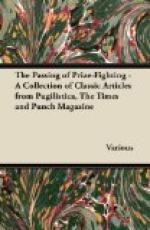I have been reading with some morbid interest a series of contributions to the pages of a contemporary from several more or less distinguished literary men who have apparently been invited to express their opinions, favourable or the reverse, on the recently launched proposition to establish in our midst, after the French model, a “British Academy of Letters.” Some ask, “What’s the use?” Others want to know who is to elect the elected, and seem much exercised in their minds as to the status and qualifications of those who ought to be chosen for the purpose of discharging this all-important function. As to what would be the use of an institution of the kind, the answer is so obvious that I will not attempt to reply to it. But if it comes to naming a representative body capable of selecting the two or three thousand aspirants who have already, in imagination, seen their claims to the distinction recognised by the elective body to which has been entrusted the duty of weighing their respective merits—well then, to use a colloquial phrase, I may confidently say that “I am all there!”
Of course. Royalty must head it, so I head the list of, say, twelve Academic Electors, with the name of H.R.H. the Prince of WALES. This should be followed up by that of some generally widely-known personage, who has the literary confidence of the public, and in this connection, I have no hesitation in supplying it by that of the Compiler of Bradshaw’s Railway Guide. Several now should follow, of varied and even conflicting interests, so as to satisfy any over-captious criticism inclined to question the thoroughly cosmopolitan character of the elective body. And so I next add, Mr. Sheriff AUGUSTUS HARRIS, H.R.H. the Duke of CAMBRIDGE, the Proprietor of PEARS’ Soap, and the Beadle of the Burlington Arcade.
It might now be well to give a distinctively literary flavour to the body, and so I am disposed to continue my list with the names of the Poet Laureate and the City Editor of Tit Bits, following them up with the representatives of commercial enterprise, speculative art, and sportive leisure, guaranteed respectively by the names of the Chairman of the Chelsea Steam-boat Company, Mr. R. D’OYLY CARTE, and Prince HENRY OP BATTENBERG. For the twelfth, and remaining name, I would suggest that of Mr. HENRY IRVING, the Archbishop of CANTERBURY, the Manager of Madame TUSSAUD’S Wax Works, Sir WILFRID LAWSON, General BOOTH, Mr. SLAVIN, Mr. J.L. TOOLE, or any other striking or notable one that arrests the eye with the familiarity of long acquaintance. With the existing deplorable position of the Pantomime literature of the country, there can be little need to question further the necessity of a British Academy of Letters. The naming of those who are to constitute that institution is another thing; but if an authoritative fountain-head, to discharge this inevitable function, is sought, and the public puts the question, “Quis Nominabit?” I think, Sir, you will admit that I have most satisfactorily supplied the answer. Trusting to your judicious appreciation of the full gravity of the matter at issue, to publish this communication,
I am, Sir, your obedient servant,




